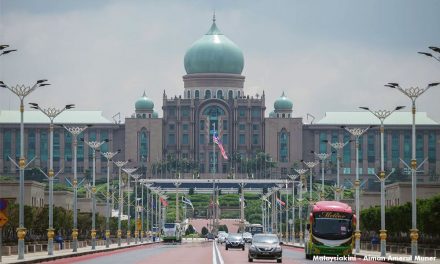Govt studying mix-and-match vaccines approach to boost efficacy
Malaysia is monitoring closely the mix-and-match vaccines approach, with AstraZeneca as the first dose followed by Pfizer–BioNTech for the second dose. Covid-19 National Immunisation Programme (NIP) coordinating minister Khairy Jamaluddin said this followed reports that many countries are doing it to boost vaccine efficacy. Khairy, who is also the science, technology and innovation minister, said last week the Vaccine Selection Technical Working Group, chaired by Institute of Clinical Research director Dr Kalaiarasu Peariasamy, had presented a paper on heterologous vaccination where two different vaccines are used to boost efficacy against different variants. “We have real-world data that we received from Germany regarding heterologous vaccination, using AstraZeneca for the first dose and Pfizer as the second dose, which has been shown to boost the antibody and proven more effective against variants. More data is coming in and we are monitoring this closely. We do not want to make a quick decision on this before getting more data,” he said. Khairy said the approach was also possible when facing vaccine supply constraints. (NST Online)
8% of households slipped from M40 to B40
More than 600, 000 households from the middle 40% (M40) income group have slipped into the bottom 40% (B40) category as the Covid-19 crisis delivered a major blow on Malaysians’ income level, according to the Economic Action Council (EAC). Against the country’s 7.28 million households, as reported by the Statistics Department for the year 2019, this represents at least 8% of households that have seen incomes drop below the B40 income maximum threshold of RM4, 850 a month. The significant drop in income levels raises concerns about widening inequality and the impact on Malaysians’ socioeconomic standing. “The pandemic dragged our GDP per capita down by about 8.4%. Earlier on, we were 10.5% behind the World Bank’s high-income threshold level, but now we are 18% behind,” said EAC executive director Prof Tan Sri Noor Azlan Ghazali. The EAC secretariat has called for the resetting of the Malaysian economy as the country is charting an “exit plan” out of the Covid-19 crisis.The secretariat outlined eight reset agendas, 30 focus areas and 153 reset initiatives as part of its months-long study on aligning the country to the new economic landscape. The government has numerous measures worth RM380bil in stimulus that are already underway in addressing the Covid-19 impact on businesses, unemployment, income levels and the vulnerable sections of the society. (The Star)

Malaysia’s real estate industry may see slower recovery in 2H
The recovery of the country’s real estate industry in the second half of this year may be dampened by issues in the construction sector, which is facing raw materials supply pressure. CBRE Research Asia Pacific (APAC) executive director Ada Choi said the rental market in Malaysia, however, is expected to be flat as the research firm is expecting only a mild decline in rents of less than 5% for 2021. “I do see there will be improvement but it will probably be first reflected from the demand and recovery in the rental levels. Regionally, the economy is expected to rebound despite a delayed recovery in Japan and India,” she said. Narrowing on the office rentals in the future, Choi said landlords would need to re-think about the user experience as occupiers would no longer be using the space due to rents and locations only, but would also lean more on the attributes of the buildings. “This includes flexible office options, shared meeting spaces, sustainable or latest technology settings. These will be among the prerequisites for the blue-chip tenants,” she said. She also noted that investments in the real estate sector in the region continue to grow as research has shown that 96% of respondents are going to increase their investment levels mainly in Australia, Hong Kong and Singapore. (The Edge)
Petronas, Singapore’s Sea among firms eyeing digital banking licence in Malaysia
Sea Ltd and national oil company Petroliam Nasional Bhd (Petronas) are among companies planning to bid for a digital banking licence in Malaysia, according to people familiar with the matter, as the country prepares to open up its financial industry. Local conglomerates Genting Bhd and YTL Corp Bhd and the Sarawak government are also considering a bid, according to the source. They join ride-hailing and payment firm Grab Holdings Inc, Sunway Bhd and others, which have also expressed interest. Malaysia’s plan to issue as many as five digital banking licences has unleashed a flurry of activities among tech firms, banks and others seeking to gain a foothold in financial services. Final bids are due by June 30, and Bank Negara Malaysia (BNM) is expected to decide on the winners by the end of 2022. Malaysia joins Hong Kong and Singapore in opening up its banking sector to non-financial players to keep up with a shift towards technology, non-cash transactions and online lending. (The Edge)
Plans in the works for walk-in vaccination
Walk-ins to vaccination centre will be introduced possibly by the end of August or mid-September, says Khairy Jamaluddin. The coordinating minister for the National Covid-19 Immunisation Programme said the government would introduce it once those who were registered had been immunised. “I think once we have cleared them (those who are registered) by the end of August or early September then we will introduce walk-ins. You can just go in, show up, and be vaccinated. You will not need a registration anymore, ” he said, adding that the authority was unable to allow walk-ins currently to be fair to those who had registered. (The Star)





